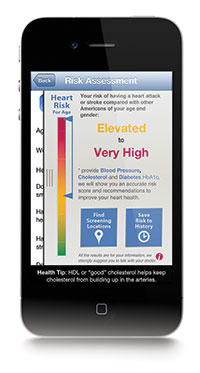For years, cardiologists have warned people about three key risk factors for heart disease: high blood pressure, high cholesterol levels and smoking.

A new mobile app from Marshfield Clinic can help you know your risk of heart attack or stroke. Now you can add another major risk factor: lack of exercise. While there is debate about how much exercise constitutes enough, some heart specialists now believe that you need to exercise every single day if you really want to protect yourself against heart disease.
Lack of exercise
A study published recently in the prestigious medical journal, The Lancet, suggested that lack of exercise is just as bad for the heart as smoking. Besides heart disease, the study concluded that lack of exercise also contributes in a major way to the incidence of diabetes, breast and colon cancers.
"This was very surprising. Almost everybody knows how dangerous smoking is," said Marshfield Clinic Cardiologist
Shereif Rezkalla, M.D. "We have made some great strides in the last two to three decades, to the point that we are almost surprised now when we see someone smoking."
The American Heart Association recommends that people get at least 150 minutes per week of exercise, or 30 minutes per day, five times per week.
Choose something you can stick with and make it a regular part of your life.
For many, an easy choice is brisk walking.
Dr. Rezkalla has done his own research and compiled research conducted by others. He's convinced that for maximum protection, the heart has to be conditioned by regular exercise. And by "regular," he means every single day.
"I have seen articles on what is called preconditioning of the heart through exercise," he explained. By preconditioning the heart, you can reduce your likelihood of a heart attack, and if you do have an attack, it may not cause as much damage to the heart muscle.
The problem is that these protective effects only last for about 24 hours. If you are unfortunate enough to have a heart attack during a gap in exercise, you will not have this preconditioning benefit.
"Exercise does not have to be extensive or strenuous, but it should be persistent and consistent," he said. Just 30 minutes of walking at a brisk pace is enough. Because he believes so strongly in the power of daily exercise, he now gets up 30 minutes earlier and spends that time on a treadmill in his home.
Besides simple walking, you can incorporate exercise into your daily routines by using stairs rather than elevators, and parking your car farther away from entrances to work, stores or other businesses.
Unhealthy diet
Milind S. Shah, M.D., another Marshfield Clinic cardiologist, agrees exercise is important, and said we have to pay equal attention to diet.
"We have an epidemic of obesity, especially in young people," he noted. "We need to work together to improve the health consciousness of our kids." He noted the irony of high school sports teams competing vigorously on a road trip, then stopping at a fast-food restaurant on the way home. While it's true that such restaurants may offer healthy salads, it's not realistic to think that many of the students will choose them rather than fried and fatty offerings.
Dr. Shah noted that many foods are loaded with sodium, which offers appealing taste but is a major contributor to high blood pressure. You'll find excessive amounts of sodium in many fast-food offerings, canned food such as soups, and even some pizza dough.
To reduce sodium intake, read labels and limit the amount of processed (prepackaged) food you eat. You can increase healthful eating by adding more fresh fruits, vegetables and whole grains, and preparing meals from your own ingredients.
As a cardiologist, he sees only people who already have heart disease or are at serious risk for it. He wonders how many of those problems can be prevented by a good partnership between the patient and their primary care provider.
"People are usually much more receptive to this if they've had a heart attack," he said. "Once we show them the evidence from the tests we do, they better understand that they play an important role in reducing their risk."
Watch for 'stuttering' pain
About 40 percent of all heart attacks occur suddenly, with little or no warning. About 6 or 7 percent of those patients will die because they are in a remote location or unable to call for help. Many people have a series of clots that are formed, then dissolved by the body's own defense mechanisms. This can buy you a little more time, but you must pay attention to what Dr. Shah called a "stuttering" phase.
"Your chest pain starts, then seems to go away, then returns. It comes and goes," he said. "It is very important that you pick up on this stuttering phase and seek help."
The severity of pain is not an accurate predictor of how serious the heart attack is, because people vary widely in their pain threshold. An attack inside the heart muscle itself will often feel less serious than pain in the nerves going to the heart.
Living a heart-healthy life
Everyone has risk factors they cannot control, such as family history. But you can play an important role in preventing or minimizing a heart attack by following these tips:
- Monitor your cholesterol levels. Your doctor can order blood tests that measure this.
- Have your blood pressure checked regularly. Inexpensive blood pressure cuffs are available for in-home use, and some retail stores offer automated testing.
- If you smoke, stop.
- Exercise regularly, at least five days per week and preferably every day. Brisk walking for 30 minutes is enough.
- Eat a heart-healthy diet that's low in calories and fats, and has more fresh fruits, vegetables and whole grains.
- Pay attention to any pain signals your body may be trying to send you.
